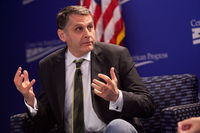Secular
 From Conservapedia
From Conservapedia The term secular means non-religious. Officially, it is defined as "worldly" rather than "ecclesiastical" or church-based. The connotations of the term have changed over time.[1] Today the term has a positive connotation among non-believers in God, but a negative connotation among those who have faith.
The term "secular" can be used as a euphemism for atheists, to avoid negative connotations associated with atheism. Atheism actually isn't secular (common mistake) because in a secular society everyone is considered to be legally equal no matter what they believe in or don't believe in. Atheism is a religious point of view that God(s) do not exist and is therefore not all inclusive.
The United States was founded as a secular republic, where religious freedom is affirmed in the Constitution and where no special religion is established. However, 'secular' here is not a synonym for 'atheistic' as secular society includes both Atheists and believers. Moreover, it is impossible to fully separate a legislative or educations system from moral beliefs and its sources, and the Bible overall was the primary foundational single source for America's principles and precepts.
Hunter Baker in The End of Secularism, distinguishes between pluralism and secularism, and argues that while the latter has rejected religious foundations of traditional morality, yet secularism itself is an ideology based upon certain philosophical foundations, with its own presuppositions. Rather than being the impartial referee it is promoted to be, when this becomes the orthodox ideology of a nation, it works toward censoring that which opposes it, stifling religious life and discourse.
Contents
Secularism is exhausted and unconfident[edit]
See also: Decline of the atheist movement
Eric Kaufmann, an agnostic professor whose academic research specialty is how demographic changes affect religion/irreligion and politics, wrote in 2010:
| “ | Worldwide, the march of religion can probably only be reversed by a renewed, self-aware secularism. Today, it appears exhausted and lacking in confidence... Secularism's greatest triumphs owe less to science than to popular social movements like nationalism, socialism and 1960s anarchist-liberalism. Ironically, secularism's demographic deficit means that it will probably only succeed in the twenty-first century if it can create a secular form of 'religious' enthusiasm.[3] | ” |
In recent years, a number of notable atheists have expressed pessimism about the future of the atheist movement (see: Decline of the atheist movement).
Secular state[edit]
See also: Secular state
A secular state is an idea related to secularism, where a state purports to be neutral in matters of religion, supporting neither religion nor irreligion. Most purported secular states teach irreligious evolutionism that employs methodological naturalism so they are not neutral when it comes to religion/irreligion (see: Evolutionary indoctrination and Atheist indoctrination).
In 2018, The Week reported:
| “ | Not only has secularism failed to continue its steady global march but countries as varied as Iran, India, Israel, Algeria, and Turkey have either had their secular governments replaced by religious ones, or have seen the rise of influential religious nationalist movements. Secularization, as predicted by the social sciences, has failed....
Religion is not going away any time soon, and science will not destroy it. If anything, it is science that is subject to increasing threats to its authority and social legitimacy.[4] |
” |
The Constitution of Bangladesh has been amended to make Islam the state religion.[5]
History of Secularism[edit]
The derivation of an ethical code from purely secular "worldly" concerns begins in Ancient Greece with the philosophical study of nature. The Hebrew term for nature is not found in the Bible.[6] Hence, natural law, natural justice, and natural rights are Hellenic in origin. Greek and Roman philosophers, while not atheists, nevertheless built their ethnical philosophy from natural considerations.
Christian theologians differed on their assessment of secular thought. Tertullian asks "What has Athens to do with Jerusalem?" On the other hand, Thomas Aquinas championed secular thought and provocatively starts the Summa Theologica with the question: "Whether, besides philosophy, any further doctrine is required?"[7] After Aquinas, a harmony between secular thought and religion was the rule until the 19th century. The notion of secularism being inherently anti-religious becomes the norm after the French Revolution.
It was made famous by British Writer George Jacob Holyoake
Atheism, secularism and their bland and uninspiring nature[edit]
Further reading[edit]
- Emmet Kennedy, "The Tangled History of Secularism," Modern Age (Winter 2000) Volume 42, Number 1; online edition
- Hunter Baker, The End of Secularism
External Links[edit]
See also[edit]
References[edit]
- ↑ Its original definition preserved its Latin meaning - "of an age" - as evinced in the Secular Games, or the Carmen Secularae ("Song of the Augustan Age") by Horace.
- ↑ Berlinerblau, Jacques (February 4, 2011). "Obama at the National Prayer Breakfast". The Chronicle of Higher Education/Brainstorm blog. Retrieved on May 29, 2015.
- ↑ Shall the religious inherit the earth? - Eric Kaufmann
- ↑ Sorry, scientists. Religion is here to stay. by Peter Harrison, The Week, September 12, 2017
- ↑ ‘I raised my voice because secularism was under threat’
- ↑ Leo Strauss. Natural Right and History.
- ↑ Thomas Aquinas. Summa Theologica.
Categories: [Religion and Politics]
↧ Download as ZWI file | Last modified: 02/17/2023 07:02:45 | 57 views
☰ Source: https://www.conservapedia.com/Secular | License: CC BY-SA 3.0
 ZWI signed:
ZWI signed:
 KSF
KSF